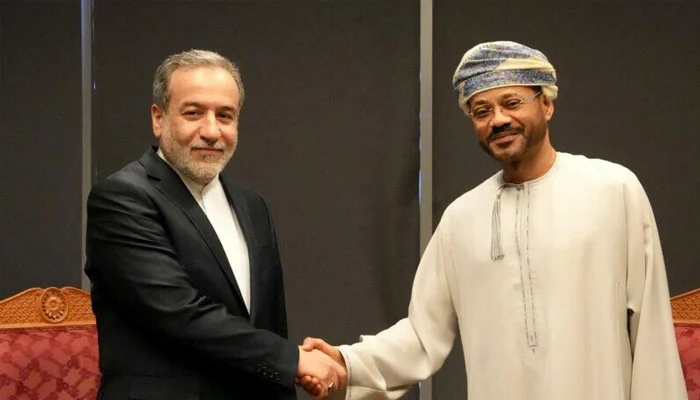Iran and the US held “productive” talks in Oman on Saturday and agreed to reconvene next week, Tehran announced, in a dialogue intended to address Tehran’s escalating nuclear programme as President Donald Trump threatens military action if a deal is not reached.
“I think we are very close to a basis for negotiations and if we can conclude this basis next week, we’ll have gone a long way and will be able to start real discussions based on that,” Iranian Foreign Minister Abbas Araqchi told state television.
Araqchi described the talks – the first between Iran and a Trump administration, including his initial term from 2017-21 – as taking place in a “productive, calm and positive atmosphere”.
“Both sides have agreed to continue the talks … probably next Saturday … Iran and the US side want an agreement in the short term. We do not want talks for (the sake of) talks,” Araqchi added.
There was no immediate comment from the US regarding the discussions.
Saturday’s exchanges were indirect and facilitated by Oman, as preferred by Iran, rather than a direct meeting as demanded by Trump. Each delegation occupied separate rooms and exchanged messages through Oman’s foreign minister, according to Iranian Foreign Ministry spokesman Esmail Baghaei.
Araqchi mentioned that his delegation had a brief encounter with their US counterparts, headed by Trump’s Middle East envoy Steve Witkoff, after the conclusion of the talks.
“After the end of more than 2-1/2 hours of indirect talks, the heads of the Iranian and American delegations spoke for a few minutes in the presence of the Omani foreign minister as they left the talks. It (the encounter) was based on our political etiquette,” Araqchi explained.
“The current focus of the talks will be de-escalating regional tensions, prisoner exchanges and limited agreements to ease sanctions (against Iran) in exchange for controlling Iran’s nuclear programme,” an Omani source informed Reuters.
Baghaei disputed this account but did not specify what aspects were inaccurate.
Oman has a long-standing role as an intermediary between Western powers and Iran, having previously brokered the release of several foreign citizens and dual nationals detained by the Islamic Republic.
Tehran approached the talks cautiously, expressing skepticism about the possibility of a deal and suspicion towards Trump, who has repeatedly threatened to bomb Iran if it does not halt its accelerating uranium enrichment programme – viewed by the West as a potential path to nuclear weapons.
While both sides have suggested the possibility of some progress, significant differences remain in a dispute that has persisted for over two decades. Iran has consistently denied seeking nuclear weapons capability, but Western countries and Israel believe it is secretly attempting to develop the means to build an atomic bomb.
“This is a beginning. So it is normal at this stage for the two sides to present to each other their fundamental positions through the Omani intermediary,” Baghaei stated.
Signs of progress could help de-escalate tensions in a region that has been volatile since 2023 due to conflicts in Gaza and Lebanon, missile exchanges between Iran and Israel, Houthi attacks on Red Sea shipping, and the overthrow of the government in Syria.
High Stakes
However, failure would heighten fears of a broader conflict across a region that is a major exporter of the world’s oil. Tehran has warned neighboring countries hosting US bases that they would face “severe consequences” if they were involved in any US military action against Iran.
“There is a chance for initial understanding on further negotiations if the other party (US) enters the talks with an equal stance,” Araqchi told Iranian TV.
Iran’s Supreme Leader Ayatollah Ali Khamenei, who holds the ultimate authority on key state matters, has granted Araqchi “full authority” for the talks, an Iranian official disclosed to Reuters.
Iran has ruled out negotiating its defence capabilities, including its ballistic missile programme.
Western nations assert that Iran’s enrichment of uranium, a nuclear fuel source, has significantly exceeded the requirements of a civilian energy programme and has produced stockpiles at a level of fissile purity nearing that required for nuclear warheads.
Trump, who reinstated a “maximum pressure” campaign on Tehran in February, withdrew from a 2015 nuclear agreement between Iran and six world powers in 2018 during his first term and reimposed severe sanctions on the Islamic Republic.
Since then, Iran’s nuclear programme has advanced considerably, including enriching uranium to 60% fissile purity, a technical step away from the levels needed for a nuclear weapon.
Israel, Washington’s closest ally in the Middle East, considers Iran’s nuclear programme an existential threat and has long threatened military action against Iran if diplomacy fails to curb its nuclear ambitions.
Tehran’s influence throughout the Middle East has been significantly weakened over the past 18 months, with its regional allies – known as the “Axis of Resistance” – either dismantled or severely damaged since the commencement of the Hamas-Israel war in Gaza and the fall of Bashar al-Assad in Syria in December.



